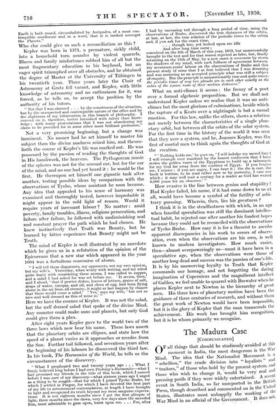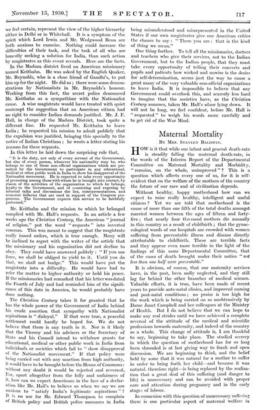The Madura Case
[COMMUNICATED]
OF all things that should be studiously avoided at this moment in India, the most dangerous is the War Mind. The idea that the Nationalist Movement is a " rebellion," the crude division into " loyalists " and " traitors," of those who hold by the present system, and those who wish to change it, 'would be very real and pressing perils if they were widely entertained. A recent event in South India, so far unreported in the British Press, though described and commented on in the United States, illustrates most unhappily the working of the War Mind in an official of the Government. It does not,
we feel certain, represent the view of the higher hierarchy either in Delhi or in Whitehall. It is a symptom of the spirit which Lord Irwin and Mr. Wedgwood Benn are both anxious to exorcise. Nothing could increase the difficulties of their task, and the task of all who are honestly seeking a solution for India, than such action by magistrates as this event reveals. Here are the facts.
In the Madura district lived an American missionary named Keithahn. He was asked by the English Quaker, Mr. Reynolds; who is a close' friend of Gandhi's, to put him up for the night. He did so ; there were some demon- strations by Nationalists in Mr. Reynolds's honour. Working from this fact, the secret police denounced Mr. Keithahn as a sympathiser with the Nationalist cause. A 'Wise magistrate would have treated with quiet contempt the suggestion that an American citizen had no right to consider -Indian- demands justified. Mr. J. F. Hall, in charge of the Madura District, took quite a different line. He requested Mr. Keithahn to leave India ; he requested his mission to admit publicly that the expulsion was justified, bringing this specially to the notice of Indian Christians ; he wrote a letter stating his reasons for these requests.
In this letter he laid down the surprising rule that,
" It is the duty, not only of every servant of the Government, but also of every person, whatever his nationality may be, who belongs to one of those non-official organizations which are per- mitted by the Government to participate in any educational, medical or other public work in India to show his disapproval of the Nationalist movement. He is expected to take every opportunity of promoting among those with whom be is brought into contact, by reason of the activities of the organization to which he belongs, loyalty to the Government, and of countering and exposing by informal talks and discussions the lies, misrepresentations, and economic fallacies that are used in support of the Congresspro- gramme. The Government expects this service to be faithfully performed."
Mr. Keithahn and the mission to which he belonged complied with Mr. Hall's requests. In an article a few weeks ago the Christian Century, the American " journal of religion;" put the word " requests " into inverted commas. This was meant to suggest that the magistrate really issued orders, which is true enough. Many will be inclined to regret with the writer of the article that the missionary and his organization did not decline to obey. They could have answered politely : " If you use force, we shall be obliged to yield to it. Until you do that, we shall not budge." This would have put the magistrate into a difficulty. He would have had to refer the matter to higher authority or hold his peace. If the missionaries had remarked that his letter was dated the Fourth of July and had reminded him of the signifi- cance of this date in America, he would probably have done nothing.
The Christian Century takes it for granted that he has the whole power of the Government of India behind his crude assertion that sympathy with Nationalist aspirations is " disloyal." If that were true, a peaceful settlement could hardly be hoped for. We do not believe that there is any truth in it. Nor is it likely that the Viceroy. and his advisers or the Secretary of State and his Council intend to withdraw grants for educational, medical or other public work in India from individuals or societies which fail to " show disapproval of the Nationalist movement." If that policy were being carried out with any sanction from high authority, it would have to be brought before the House of Commons : without any doubt it would be rejected and reversed.. For, apart altogether from the folly and unfairness of it, how can we expect Americans in the face of a declar- ation like Mr. Hall's to believe us when we say we are anxious to " satisfy India's legitimate aspirations " It is no use for Mr. Edward Thompson to complain of British policy and British police measures in India
being misunderstood and misrepresented in the United States if our own magistrates give our American critics the chance to say : " There you are : that is the kind of thing we mean."
One thing further. To tell all the missionaries, doctors and teachers who give their services, not to the Indian Government, but to the Indian people, that they must take every opportunity of telling their converts and pupils and patients how wicked and unwise is the desire for self-determination, seems .just the way to cause a great many of the very valuable non-official organizations to leave India. It is impossible to believe that any Government could overlook this, and scarcely less hard to imagine that the societies have, as the Christian Century assumes, taken Mr. Hall's ukase lying down. It will not be long, we feel confident, before Mr. Hall is " requested " to weigh his words more carefully and to get rid of the War Mind.









































 Previous page
Previous page